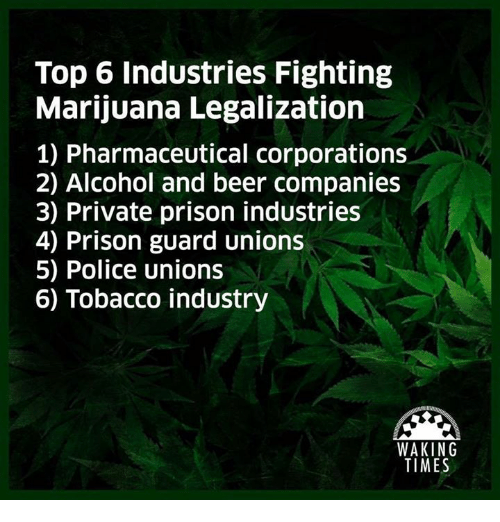
While Big Pharma is one of the better-known losers in legal medical marijuana, some of the other opponents who lose big may not be so clearly seen.
Opponents of marijuana legalization argue that decriminalizing pot increases crime, creates juvenile delinquents and can even lead to more marijuana-related deaths. But there is another reason for the crusade against marijuana that involves some people losing lots of money as the country becomes increasingly pot-friendly, according to a recent report from The Nation and a study by the Center for Responsive Politics.
The biggest players in the anti-marijuana legalization movement are pharmaceutical, alcohol and beer companies, private prison corporations and police unions, all of whom help fund lobby groups that challenge marijuana law reform. In 2010, California Beer and Beverage Distributors funneled $10,000 to Public Safety First, a political action committee, or PAC, that led the opposition to California’s Prop 19. The initiative, if passed, would have legalized recreational marijuana in the state.

One Of The Losers In Medical Marijuana Legalization Is Private Prisons
Corrections Corporations of America, one of the largest for-profit prison companies in the U.S., has spent nearly $1 million a year on lobbying efforts. The company even stated in a report that “changes with respect to drugs and controlled substances … could affect the number of persons arrested, convicted, and sentenced, thereby potentially reducing demand for correctional facilities to house them.”
Among the largest donors to Partnership for Drug-Free Kids, a New York City-based nonprofit that campaigns against teen drug and alcohol abuse, are Purdue Pharma, makers of the painkiller OxyContin, and Abbott Laboratories, which produces the opioid Vicodin. Community Anti-Drug Coalitions of America, or CADCA, a Virginia-based anti-drug organization, also receives donations from Purdue Pharma, as well as Janssen Pharmaceutical, a subsidiary of Johnson and Johnson that manufactures the painkiller Nucynta, according to The Nation.
The reason for opposing marijuana reform is simple: Legal weed hurts these companies’ bottom lines. “There is big money in marijuana prohibition,” the Center for Responsive Politics, a non-profit research group based in Washington, D.C., notes in a recent series on marijuana lobbying efforts, including who funds legislation to keep the drug illegal.
Losers In Medical Marijuana Legalization Hide Their Involvement By Funding Drug-Free Groups
Part of the missions of groups like Partnership for Drug-Free Kids and CADCA is to lobby Congress to maintain marijuana’s classification as a Schedule 1 drug, meaning the U.S. government considers the drug as having a high potential for abuse, has no medical use and poses risks to public safety. Nevermind that more than 22,000 people die every year in the U.S. from overdoses involving pharmaceutical drugs, according to the Centers for Disease Control and Prevention. Three out of every four pharmaceutical overdose deaths involve painkillers — more than heroin and cocaine combined.

“I think it’s hypocritical to remain silent with regard to the scheduling of hydrocodone products, while investing energy in maintaining marijuana as a Schedule I drug,” Andrew Kolodny, a New York psychiatrist and head of Physicians for Responsible Opioid Prescribing, told The Nation. “I don’t think it’s inappropriate for them to be advocating on marijuana, [but] when we have a severe epidemic in America — one the CDC says is the worst drug epidemic in US history — it makes you wonder whether or not they’ve been influenced by their funding.”
The idea is that drug companies want to sell expensive drugs by downplaying the medical benefits of marijuana, alcohol and beer manufacturers do not want to compete for customers with legal pot, and private prisons need to fill their beds with convicted drug offenders. That means marijuana advocates have some pretty large — and well-funded — enemies to contend with.
By Philip Ross, Originally published August 6, 2014 in International Business Times



